
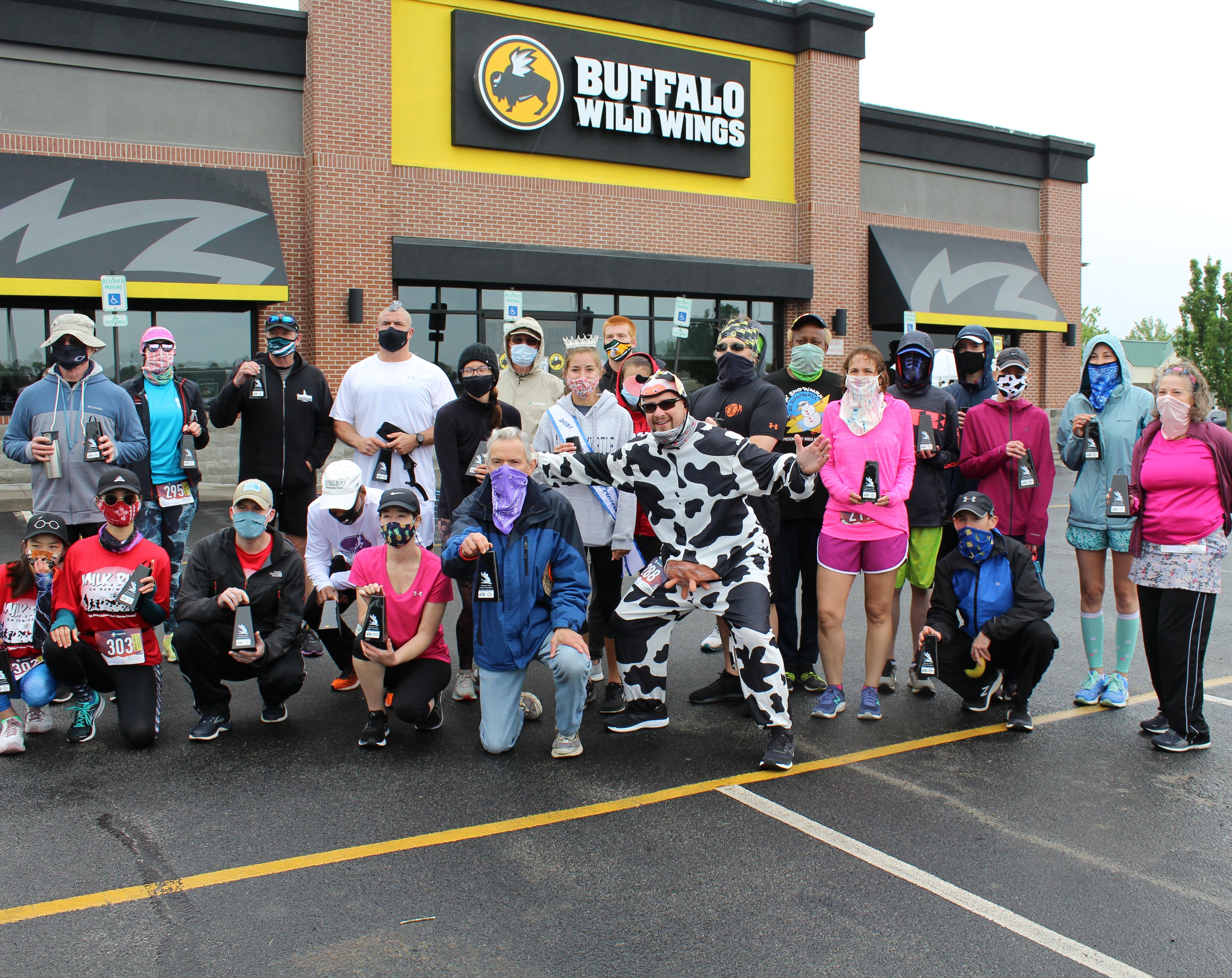





The tide is finally turning.
As a Farm Bureau, we have not had the chance to get our membership together in person since the COVID-19 pandemic began. That is about to change.
The Delaware State Fair is around the corner, and I couldn’t be more excited to see our members volunteering with smiles as bright as the summer sun.
Participating in the annual state fair is so important to our organization; we couldn’t do it without our volunteers who offer their time to increase awareness of agriculture with our booth hosted in the Department of Agriculture's Commodity Building. Volunteers also raise money for youth scholarships by offering food with the Women’s Committee or assisting the Young Farmers and Ranchers Committee with the Antique Tractor Pull event.
The exciting part is that there’s an opportunity for everybody at the fair.
In the food booth, for example, volunteers run the show from open to close. To give it more of a family feel, each of our county Farm
Delaware Farm Bureau News
Editor
Jennifer Antonik jenn.antonik@defb.org
Delaware Farm Bureau News (ISSN 10770798), published in Camden, DE, bimonthly, by Delaware Farm Bureau. Production by Delaware Printing Company. Periodicals postage paid at Camden, DE and additional offices.
Business and Editorial Offices:
3457 S. DuPont Highway, Camden, DE 19934, 302-697-3183.
Any editorial material may be reproduced with credit to this publication.
POSTMASTER: Send address changes to Delaware Farm Bureau News at the office above. Subscription
President
Richard Wilkins
1st Vice President

Bureaus choose a day to share the load together. I cannot emphasize enough how much our volunteers mean to the Delaware Farm Bureau. Without volunteers, we wouldn’t have these amazing opportunities.
I hope each of you reading this will consider volunteering during the fair for at least four hours. It makes all the difference. This would help lighten the load for some of our perennial volunteers who often work entire days to make sure they have coverage for every shift.
Volunteering at the Delaware State Fair with the Farm Bureau is an honor.
According to the Delaware State Fair website, “The original purpose of the corporation [fair] was ‘to have or manage a fair or exposition for the purpose of promoting and encouraging Agriculture and of giving pleasures and diversions to the inhabitants of rural communities within the State of Delaware.’”
A lot has changed over the years, but the fair continues to share bits of life on Delaware farms, and we are all in for that here at the Delaware Farm Bureau!
Thank you to our dedicated volunteers who show up every year - and thank you to our new volunteers who will help these committees out for the first time in 2021.
There are a lot of ways to volunteer with the Farm Bureau throughout the year, also.
Members working with the Promotions and Education Committee, for example, run a yearly photo contest, supply a safety brochure to Delaware motorists and the Department of Motor Vehicles and deliver book barns to schools throughout the state to promote ag
literacy.
More recently, this group took a moment to visit Salted Vines Vineyard and Winery in southern Delaware for a tour during their monthly meeting in May. They plan to visit other farms in the First State for their meetings in the future. More information on their work can be found later in this issue on page 8.
The Young Farmers and Ranchers Committee just worked together to put on the annual Strawberry Festival held at Bobola Farms in Dover. This annual event takes a lot of volunteers, too, and raises money for their youth scholarships which are presented during the committee’s annual Antique Tractor Pull event at the Delaware State Fair.
The Women’s Committee work to provide scholarships, run a Food Checkout Day event and make donations throughout the year to organizations in need, to name a few things.
There are also several Advisory Councils, Committees and Task Forces that meet to discuss challenges and opportunities within various segments of our agriculture industry. These are essential to assure that Delaware Farm Bureau is working to set policy that aids our farmers in growing their family business.
It is truly incredible what our organization is able to accomplish when everyone pitches in to help. It is a joy to watch it in action and know that I’m a small part of that work in progress.
As a farmer, I know I am impacted by the work of Farm Bureau. As a volunteer, it feels good to be a part of something that’s bigger than just my family or our farm.
Thank you, volunteers, for all you do.
If you are reading this and have not volunteered yet with the Delaware Farm Bureau, I urge you to consider where you could use your skills in our amazing organization and be a part of why we’re Farm Bureau Proud.
Laura Hill
2nd Vice President
William Powers, Jr.
County Presidents
Kent: Jacob Urian
Sussex: Steve Breeding
New Castle: Stewart Ramsey
Young Farmers and Ranchers
State Chair: Mollie Lynch
Kent Chair: Michael Lynch
Women’s Committee
State Chair: Mary B. Gooden
Kent Chair: Rebecca Bobola
Sussex Chair: Constance Fox
New Castle Chair: June Unruh
Kent County Directors
Bruce Dempsey
David Marvel
Ted Bobola Jr.
Sussex County Directors
Alan Bailey
Mark Davis
New Castle County Directors
Bruce Patrick Will Powers, III
Ryan Greer

On Monday, May 10, 2021, member leaders of American Farm Bureau Federation, National Cattlemen’s Beef Association, National Farmers Union, R-CALF USA, and the United States Cattlemen’s Association met in Phoenix, Arizona.
These groups convened at the request of Livestock Marketing Association to discuss challenges involved in the marketing of finished cattle with the ultimate goal of bringing about a more financially sustainable situation for cattle feeders and cow-calf producers.
The group talked openly and candidly about a wide range of important issues facing our industry today, including but not limited to:
• Packer concentration,
• Price transparency and discovery,
• Packer oversight,
• Packers and Stockyards Act enforcement,
• Level of captive supply, and
• Packer capacity.
The group also agreed to take to their respective organizations for
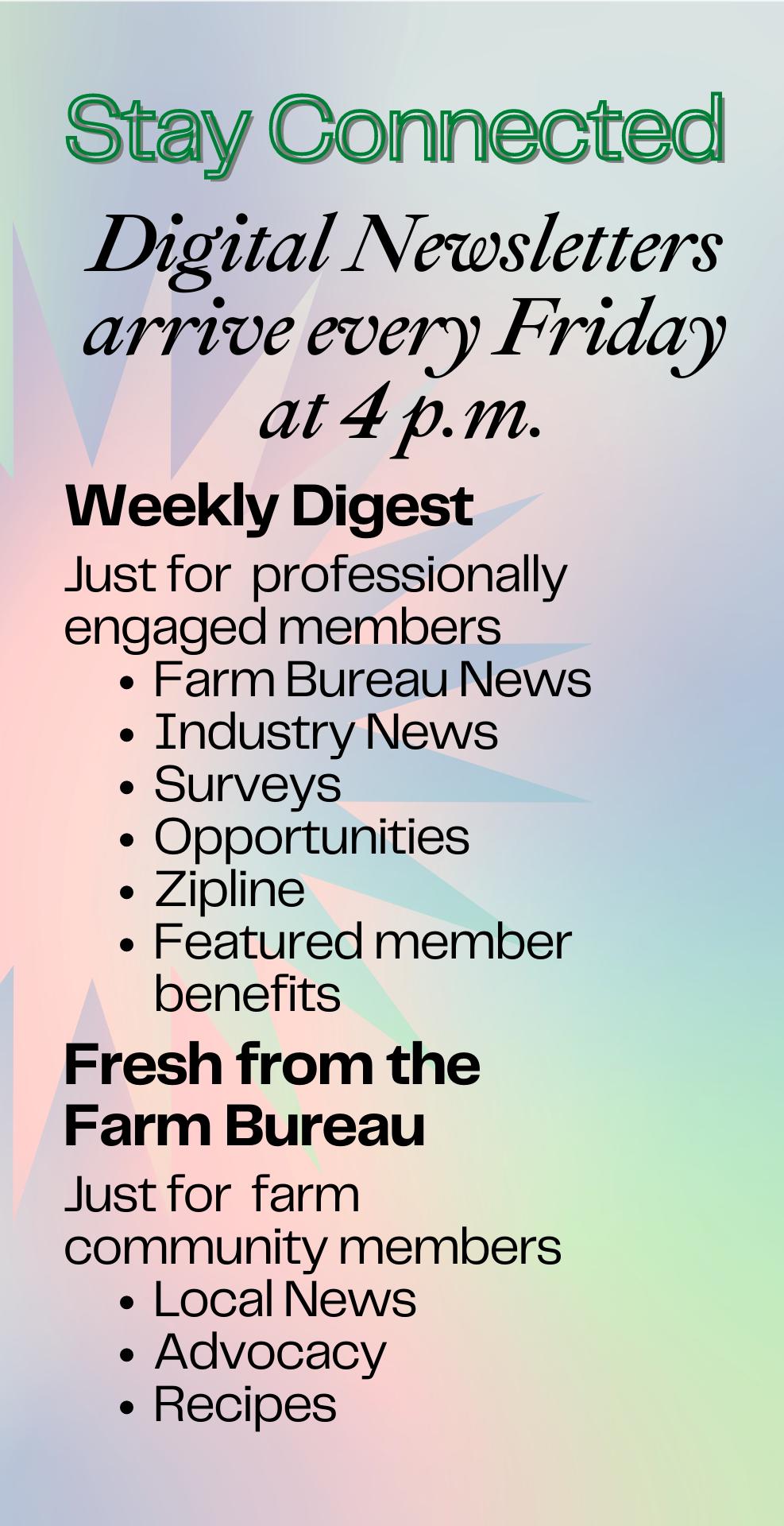
consideration these action items:
Expedite the renewal of USDA’s Livestock Mandatory Reporting (LMR), including formula base prices subject to the same reporting requirements as negotiated cash and the creation of a contract library.
Demand the Department of Justice (DOJ) issue a public investigation status report and as warranted, conduct joint DOJ and USDA oversight of packer activity moving forward.
Encourage investment in, and development of, new independent, local, and regional packers.
This unprecedented meeting brought together diverse producer organizations to identify issues and discuss potential solutions. These issues and action item lists are not comprehensive, due to time constraints of this meeting. Attending organization representatives were pleased to have reached consensus on many issues and are committed to the ultimate goal of achieving a fair and transparent finished cattle marketing system.




at (302) 697-3183
at


By Jennifer Antonik
The Delaware Farm Bureau Foundation’s 8th annual 5k Milk Run/Walk brought in more than 100 participants and served up connections that could last a lifetime.
Runners and walkers gathered in person at Buffalo Wild Wings in Dover Saturday morning, May 8, for the 5k Run/Walk along the St. Jones Isaac Branch Trail before enjoying a misty awards ceremony and free ice cream from Woodside Farm Creamery in Hockessin.
“There’s a lot of misinformation that goes on about the dairy and agriculture industries so this event helps to get the message out to those who are unaware. And the ice cream is great,” Delaware Dairy Princess Bethany Knutsen of Harrington said.
The event benefits not only the foundation but the Food Bank of Delaware’s Backpack program and the Ministry of Caring’s Milk for Children Fund, as well, according to Foundation Coordinator Kali Voshell.
Priscilla Rakestraw of the Min-

istry of Caring and Chad Robinson of the Food Bank of Delaware were both on hand for this year’s event, cheering on the participants while sharing information and updates on their organizations.
“We need the help of everybody to feed and to clothe and to shel-

ter the poorest among us,” Ms. Rakestraw said. “Because of this event, we can give milk to every child that comes to the dining room and every child that comes to our shelter. I don’t know what we would do without it. It is so important to us that people care and
for the Farm Bureau Foundation to come forward every year and say we want to help you take care of the poorest among us.”
This year, Ms. Rakestraw may have walked away from the event with more than just donations for her organization.
“The folks at Woodside Farm Creamery talked to me about truck drivers and I’m going to go home and look into starting a CDL program. It’s all about the connections,” she said.
The Ministry of Caring is located in Wilmington but serves people from all over Delaware through emergency and domestic violence shelters, child care centers, low-income senior facilities, clothing and furniture distribution centers, job placement services and more.
“We serve about 500 people a day and that’s a lot of milk. It has been challenging for the ministry but devastating for the poor,” she explained. “People come from all over the state. Some people, for
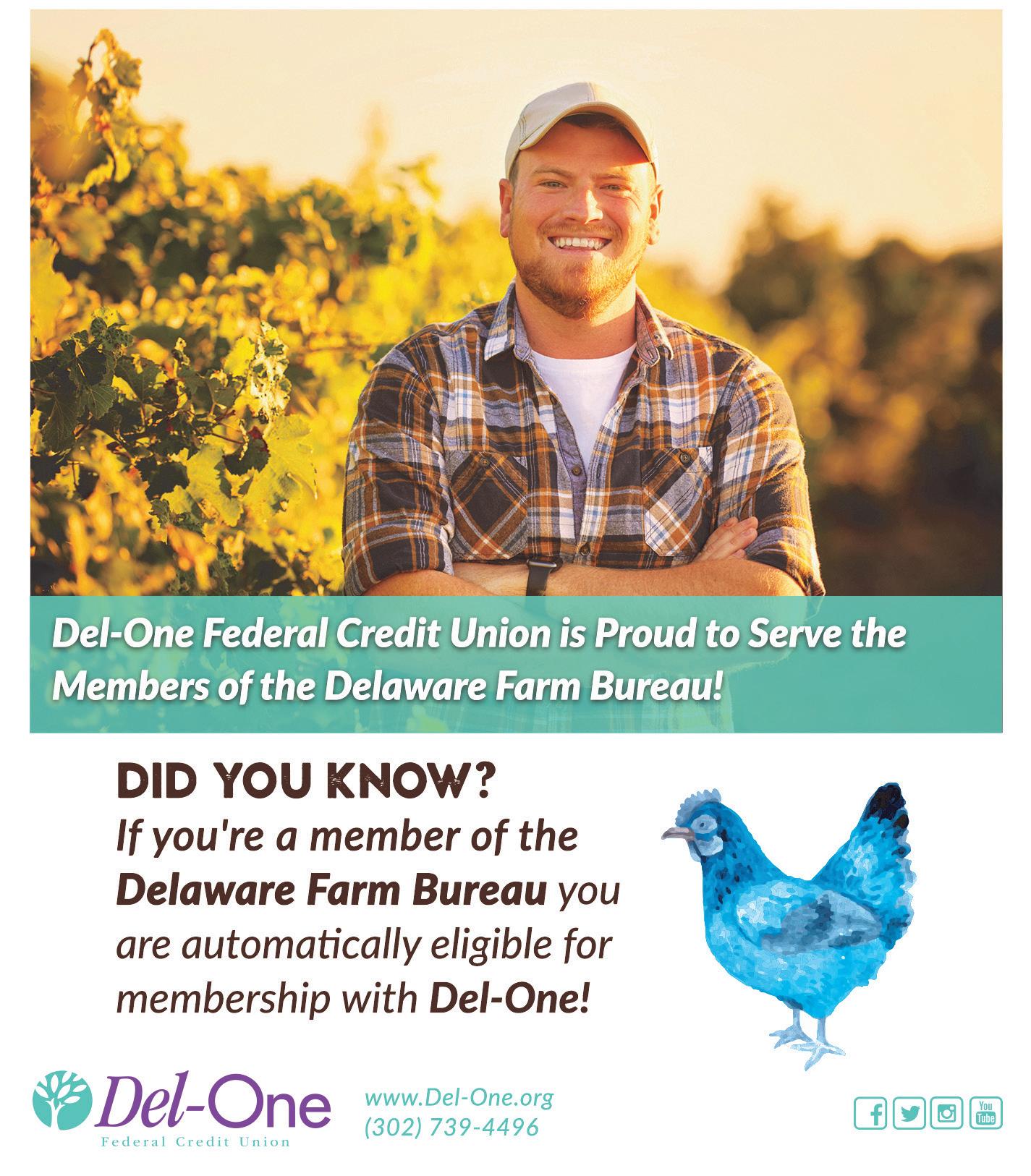
example, come as far as Sussex County to get their teeth done. We have one elderly couple that takes three buses to come to our elderly clinic. People gravitate to Wilmington because that’s where the services are. Yesterday, the young-

est was three, the oldest [people] were 87-year-old twin sisters who lost their little phone answering business and now cross the street holding on to each other to now what is their only warm meal of the day. These people have lost their job and lost their hope. We are so grateful for this.”
The Food Bank of Delaware’s Backpack Program reaches families across the state, too. According to the organization, 132 schools distributed backpacks filled with weekend meals during the 2019-2020 school year reaching 5,857 students.
For more information on the Food Bank of Delaware, visit www.fbd.org. The Ministry of Caring can be found online at www.ministryofcaring.org. Stay up-to-date or discover membership benefits with the Delaware Farm Bureau at www.defb.org.

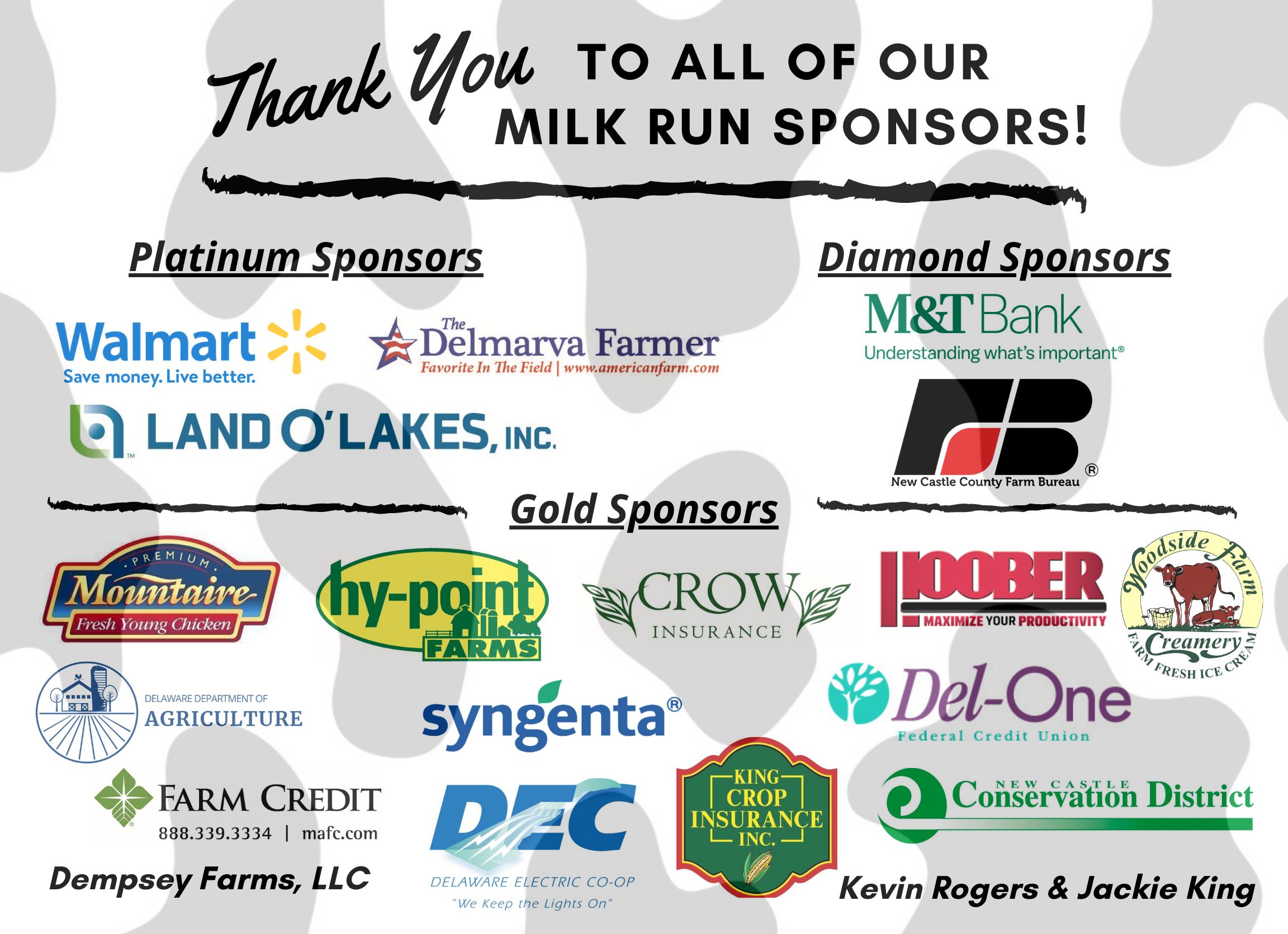










By Adrian Mobilia P& E Committee Member
Owner, Salted Vines Vinery & Winery
The Delaware Farm Bureau’s Promotion and Education Committee recently ventured out of the office for a one-of-a-kind experience.
Typically held in the DEFB state office in Camden or via Zoom, the group changed venues and held its regularly scheduled meeting at Salted Vines Vineyard & Winery May 19, 2021.
Owner, Adrian Mobilia, is a fourth-generation grape grower and is an active DEFB member. Upon arrival, committee members were given an informative and educational tour of the vineyards and winery.

Bureau Photo Contest, Attn. Mikayla Paul, 3457 S. DuPont Hwy, Camden, DE, 19934. There will be a total of four winners and six honorable mentions. This is an excellent opportunity to get our kids involved and have some fun, all while promoting DE Agriculture!
contact Mikayla Paul at mikayla. paul@defb.org to be added to the sign-up list.
We still have a few of the Case IH book Barn sponsorships available. At our last meeting, we had 12 complete sets (of six books) and seven individual books remaining. Each book sponsorship is $10 and can include a written message from the sponsor; set sponsorship is available at $60 per set. Some have been taken since the last meeting! Please think about who you may know that would want to sponsor an accurate ag book barn going to a Delaware elementary school’s book barn. This is an excellent way to get young kids excited about agriculture early in life.
Although this was the first time the P&E Committee met at a member farm, the group plans to continue visiting various member farms for meetings in the future to demonstrate the mission of education and promotion.
The 2021 Farm Bureau Photo Contest is well underway! The contest opened up May 1 and will close Oct. 31, 2021. To enter, please visit our website or mail your photo(s) along with the printed entry form to: Delaware Farm

The Delaware State Fair will be held July 22 – 31 this year! The DEFB will have a booth at the fair. This year, we will be handing out items that are related to cooking such as measuring cups and spatulas. We will also have a TV in the booth displaying videos created by members cooking with Delaware-grown produce. For the kids, we will have some branded “Squishes.” The final component to this year’s booth will be potted crops such as corn, soybean, sorghum, lima beans and peas. Each potted plant will have a label displaying information about that particular crop. We will have specially made T-shirts for booth volunteers to wear. Speaking of which, volunteers are still needed to help run the booth. Please
Finally, the June P&E Committee meeting is our designated planning meeting for the year. This meeting will be held at the DEFB office in August. All Committee members are encouraged to attend and bring ideas of where the committee can hold future meetings like the one we held at Salted Vines Vineyard & Winery.
You value keeping the legacy of your farm. We value helping farmers like you. When you’re ready to discuss your options, contact our team.



Corteva Agriscience, headquartered in Wilmington, Delaware celebrated their second anniversary as an independent company on Wednesday, June 3, 2021.
Corteva, Inc. is a major American agricultural chemical and seed company that was the agricultural unit of DowDuPont prior to being spun off and is now traded on the New York Stock Exchange (NYSE).
Delaware Farm Bureau’s President Richard Wilkins was one of the agricultural communities’ guests invited to the 2nd birthday celebration at Corteva’s Chesapeake Farms in Chestertown, Maryland. Chesapeake Farms is located between the East and West branches of the Landford Creek. The farm is devoted to the development, evaluation and demonstration of advanced agricultural practices and wildlife management techniques. The farm consists of 3,300 acres of which 1,085 acres is planted in agricultural crops for research, 1,700 acres of woodlands, and 515 acres of ponds, marshes, fields, and hedges devoted to wildlife management.
The guest list included Secretaries of Agriculture from Delaware, Michael Scuse and from Maryland Joe Bartenfelder along with their staffs and several Maryland Farm Bureau staff including Executive Director, John Torres.
Jim Collins, CEO of Corteva Agriscience, opened the celebration with the slogan “Two Years In, Twice As Good” in his global employee broadcast. Mr. Collins thanked the Corteva leadership team, and the 20,000 employees around the world, many from Corteva legacy businesses such as Dow, Dupont, Remington, and Pioneer. He mentioned that it has been a seven-year journey, including five years of planning, before the first day of Corteva on June 3, 2019.
Mr. Collins stated Corteva is being guided by science-based research to grow food and progress to more sustainable agricultural practices.
Mr. Collins recalled his first meeting with American Farm Bureau President Zippy Duvall. In their conversation, President Duvall stressed three key points of sustainable programs. First, they must be scalable to use the technology everyday of the year. Second, sustainable practices must be non-punitive to all farmers and ranchers. Final-
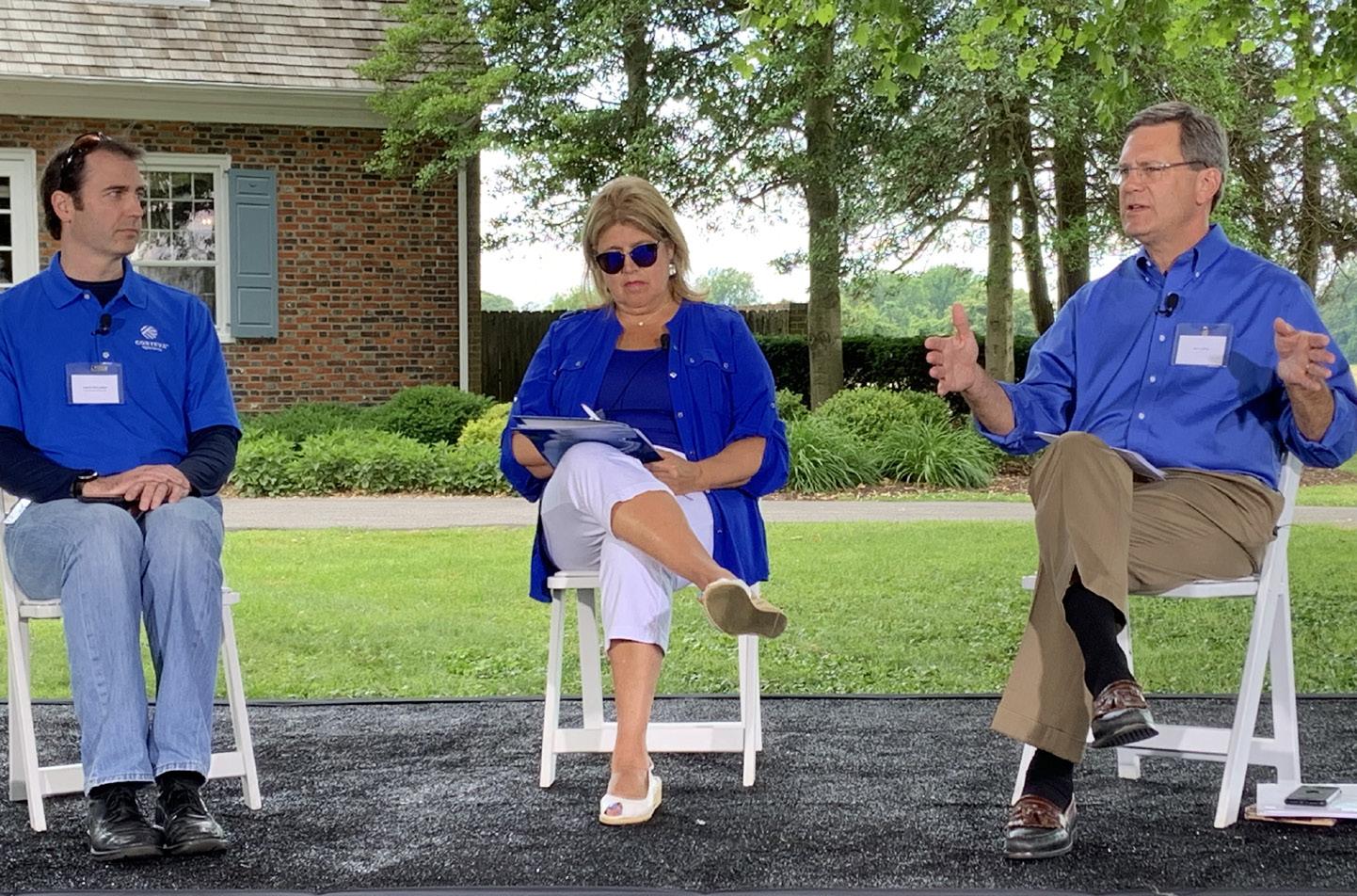
Pictured left to right - Josiah McClellan, Corporate Sustainability Leader; Anne Alonzo, SVP of External Affairs and Chief Sustainability Officer; and Jim Collins, CEO of Corteva Agrisciene.
ly, there should be some economic incentive for the farmers to implement new practices.
The invited guests toured some of the farm’s 3,300 acres, viewing no till vs conventional fields, fields planted in corn where nitrogen movement in the soil was being tracked, turfgrass studies, conservation planting, irrigation ponds and ditches to move water, and var-
ious wildlife that inhabit the farm.
After the hour tour of the farm, Jim Collins, Anne Alonzo, SVP of External Affairs and Chief Sustainability Officer, and Josiah McClellan, Corporate Sustainability Leader held a panel discussion about Corteva’s sustainable venture during the past year, and the release of their first year’s report of their sustainable commitment as

a company. There was also a question-and-answer session;.
The afternoon concluded with a presentation by Julie DiNatale, Senior Director External Affairs of Corteva’s Digital Business Platform, on the initiatives that Corteva has undertaken to assist farmers in compensation for carbon credits associated with their farm operations. This initiative is a work in progress, and Corteva has started pilot projects with farmers including Harborview Farm in Rock Hall, Maryland. Harborview Farm, owned by fourth generation farmer, Trey Hill, is about six miles southwest of the Chesapeake Farm. Ms. DiNatale also took questions about Corteva’s program from the visitors gathered for the celebration.


Abby Edwards is an ag education and agronomy student at Delaware State University. She graduated Lake Forest High School in 2019 and currently lives in Felton.
Edwards says she was always surrounded with farm families, even though she did not grow up on a farm herself.
"My father was involved with ag and, from an early age, I was in 4H throughout early childhood," she said.
She joined the FFA in middle school and "competed in pretty much every CDE," she said. "I just had a passion for agriculture and advocating for people like me who maybe didn't have an ag background. I was always the shy kid in the back of the classroom. But as my ag teacher in middle school started pushing me to get out of my comfort zone, I started feeling more comfortable with the idea of advocating. I wanted to do that for children in similar paths and pursue a career where I could advocate for the ag industry and make an impact."
Edwards has already started making an impact for children in Delaware. She has been a state FFA officer for the last two years, affording her the opportunity to "see the impact we can make in young people's lives."


Kyle Spillane is a marketing student at University of Delaware. He graduated Lake Forest High School in 2018 and is a resident of Harrington.
Like Edwards, Spillane says he joined 4H at a young age.
"I think I got into it as young as I can, I think around five or six. I went all the way until 16 or 17. It gives you a little bit of an ag overview, but they don't focus fully on ag. I got to see that at the fair," he said.
As a teenager, Spillane worked in the premiums department at the Delaware State Fair.
"I would do all the entries for livestock, for example. I learned all about the animals there," he said about his summer job. He also worked at Killen's Pond State Park with boat rentals and later, a produce stand at Indian Point Rd. where he would come to understand a different side of agriculture.
"I got a little more intimate knowledge of the crops like what they do to grow them and I learned more about farm to table," he said. "I like the work I'm doing now with the Delaware Farm Bureau, too. I feel like it's important and it matters."
Spillane and Edwards have been visiting produce stands and farms in Delaware to take pictures and promote local agriculture.
Edwards says they are especially working on finding new farms and painting the agriculture industry in a postive light.
They can be reached at the state office by calling (302) 697-3183.
The Delaware Farm Bureau Promotion & Education Committee is encouraging amateur photographers to share their photos featuring one of the First State’s top industries: agriculture.
The annual photo contest runs from May 1 through Oct. 31 each year highlights the industry and the community that helps it thrive by offering a spotlight through photography. The top four winners this year will be honored with monetary prizes and framed certificates. Their winning photographs will also be on display at the Delaware Farm Bureau office in Camden and the Delaware Agriculture Museum in Dover. They will receive $200 for first-place, $150 for second-place, $100 for third-
place or $50 for fourth-place. Six honorable mentions will also be chosen; they will receive certificates honoring their accomplishment.
Last year’s top honorees included Brittany Dempsey-Newman (first-place), Jessica Miles (second-place), Brett Coverdale (third-place) and Byron Mutchler (fourth-place).
To enter this contest online, please complete the form found at https://defb.org/photo-contest/. Photos must be included.
To enter via mail, please send photo(s) along with the printed entry form found on the website to: Delaware Farm Bureau Photo Contest, Attn. Mikayla Paul, 3457 S. DuPont Hwy, Camden, DE 19934
Lifesaving equipment and training has finally arrived in Delaware after a year’s delay due to COVID-19 travel restrictions.
Nationwide’s Nominate a Fire Company Contest awarded two fire companies in Delaware with grain bin rescue tubes. Two additional fire companies are sharing a rescue tube funded by private donations from farmers.
Dan Neenan, Director of the National Education Center for Ag Safety (NECAS), along with new Ag Safety Trainer, Terry Drees, arrived at the Odessa Fire Company, Station 4 Sunday, June 6, 2021. They brought the Odessa Fire Company a six-panel Great Wall of Rescue tube by KC Supply and an accompanying grain auger.
This rescue equipment was funded by Nationwide Insurance, through its yearly Grain Bin Rescue Tube and Training contest, and the Delaware Farm Bureau. The application to nominate the Odessa Fire Company was submitted by June Unruh, Delaware Farm Bureau New Castle County Women’s Committee Chair.
New to the 2020 contest, the Delaware Farm Bureau secured another six-panel grain bin rescue tube for the Leipsic and Little Creek Fire Companies to share.
Financial support for this rescue tube was provided by the Whitehall Neck Sportsman’s Club. The firefighters from these two companies also joined the training at Odessa Fire Company Station #4.
The training included a video classroom session and on-site training.
Firefighters also attended a practice session so they could construct the six panels into a round tube on the ground in the fire truck bay. They were also shown how to build a wall with the panels and build a half tube for rescue along the side of a grain bin.
Proper lockout/tagout techniques for energized systems like the auger in a grain bin were included in the training, along with discussions of why and how a rescue would involve cutting into a grain bin for a rescue operation.
During their practice session, firefighters put on their safety harnesses and climbed into the mobile training grain bin for simulated training. One firefighter was the “victim" while two firefighters were the “res-

June Unruh sponsor of the Odessa Fire Company for the Natiowide Grain Bin Rescue tube and training contest. Unruh was “trapped” and the rescue tube is built around her during the training.

cuers.” It took about 15 seconds for the “victim” to sink in the grain up to their waist.
The firefighters then proceeded to correctly build the rescue tube panels into a tube and extract the grain to free their “victim.” This procedure was repeated many times during the morning’s training so each firefighter could participate in this training.
One hundred and ten bushels of corn were donated to this training event from Larry Jester of Townsend.
On Monday, June 7, firefighters from Ellendale, Slaughter Beach and Milton joined Carlisle Fire Company, Station 42, in Milford for training on the use of the grain bin rescue tube. The Carlisle Fire Company won the 2020 Nationwide Grain Bin Rescue Tube and
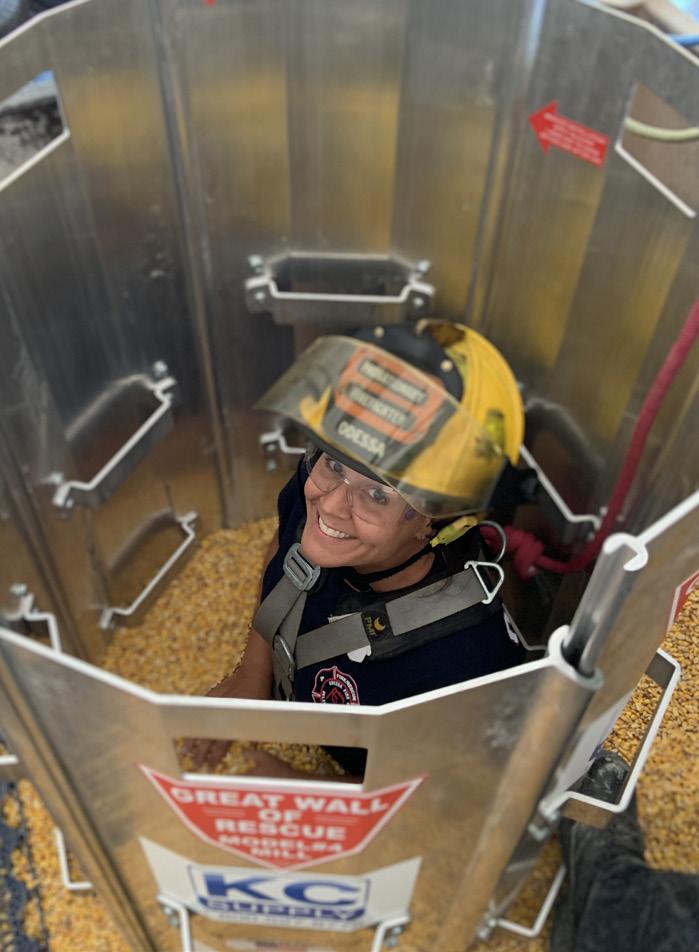
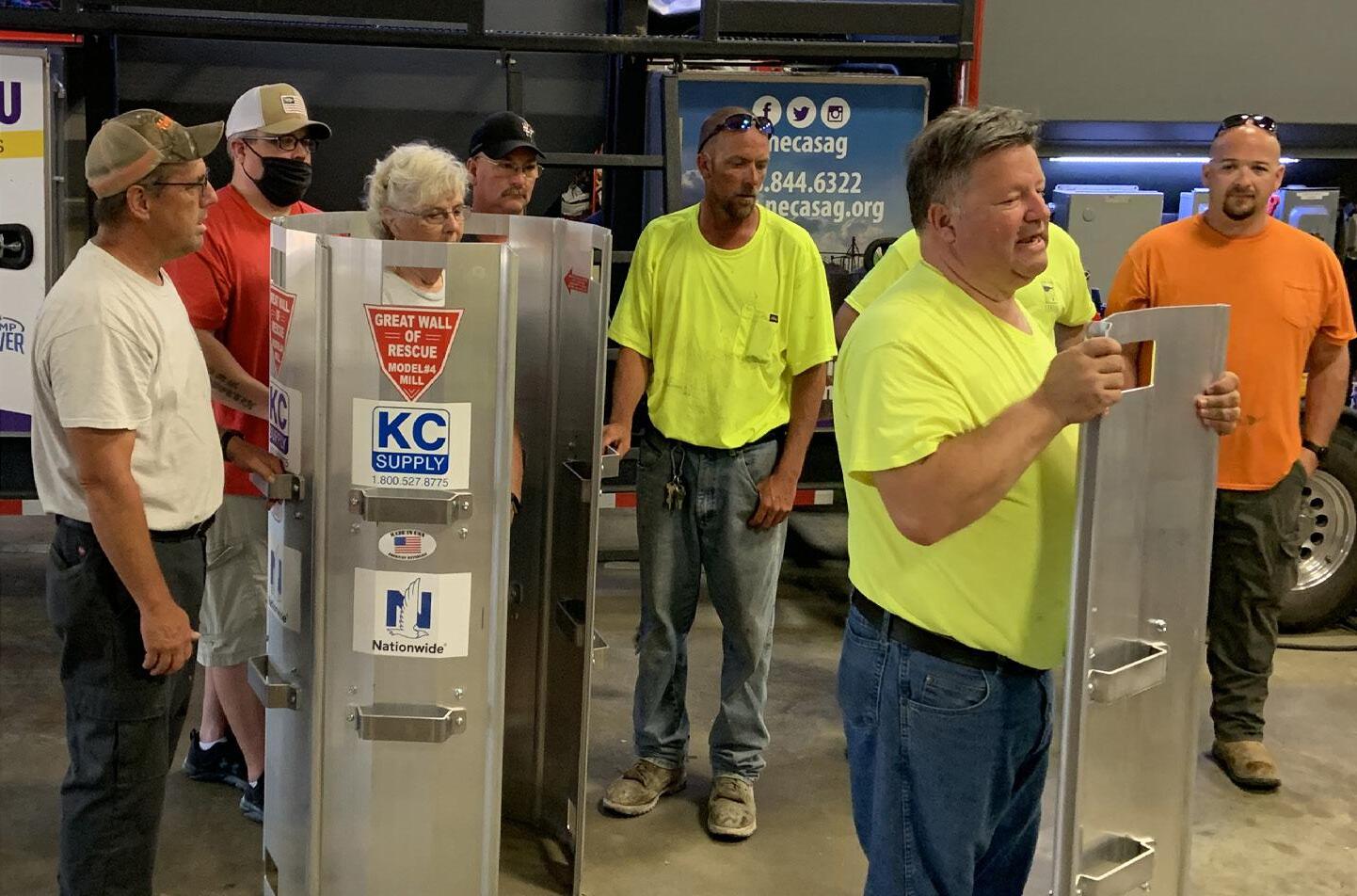
Fox, sponsor of Carlisle Fire company, station 42 for the Nationwide Grain Bin Rescue tube and training contest, is trapped. Firefighters building rescue tube from six panels in demonstration.
Training contest as the top Delaware winner and ranked in the top ten in the nation.
Connie Fox, Delaware Farm Bureau Sussex County Women’s Committee Chair submitted the application to nominate Carlisle Fire Company. NECAS Director Dan Neenan commented that it was the best grant application ever written in the six-year history of the contest.
Fox, with help from the Sussex County Farm Bureau Board of Directors, mapped out the location of grain storage bins in the Carlisle Fire District including the names of the many family farms that could benefit from the rescue equipment.
Like Sunday’s training session, every firefighter in attendance was
given an opportunity to participate in a simulated grain bin rescue. Grain was donated by Milford Grain courtesy of Marcus Hammond. Several of Milford Grain employees also participated in the training.
After the training, State Senator Dave Wilson presented a Delaware State Senate tribute to the Carlisle Fire Company for winning the Nationwide Grain Bin Rescue Tube and Training award from Nationwide in 2020.
Delaware Farm Bureau members have volunteered their time and effort to nominate ten different fire companies for the 2021 Nationwide Nominate Your Fire Company Contest. Stay tuned for those results.
By Jennifer Antonik
As American Farm Bureau Federation offices begin opening up, a face from Delaware will find his way through the halls again.
Delaware Farm Bureau member and 2019 University of Delaware graduate David Townsend of Townsend was recently promoted to Assistant Director for Membership Engagement at the national level.
He coordinates with the 10-member board of volunteers on events, conferences and other promotions and education related needs.
"In my current role, it definitely gives me the perspective of the consumer," he said.
It's a perspective he knows all too well.
Originally from Newark, he says he didn't see agriculture around him as much as he did when he moved further south to Townsend. That move helped open his eyes to where
his food came from - local farmers. He would eventually attend Middletown High School and became interested in food prep and culinary work.
"It was in the same wing as the ag department," he recalled.
He ended up taking three levels of animal science courses and three levels of plant science.
Townsend says he naturally became involved in the FFA and competed in agronomy and milk quality and products.
His FFA experiences took him to national events where he would meet professionals from another organization he had not yet encounted - Farm Bureau.
"Coming from not an ag background, I had no idea this organiazation existed," he said. "The leaders in these organizations weren’t that much older than me, but they were really well polished. That impressed
me."

His national experiences with the FFA quickly turned international. He ran for local chapter leadership and again at the state level. Topping off his leadership roles, he was also elected as the 2016-2017 National FFA president.
These roles would take him as far as Japan as the team learned about the global agriculture economy.
"I had my first plane ride. It was all an incredible experience. I visited 29 states, attended trainings, conventions, conferences... these people were just as passionate about ag as I was," he said.
Townsend graduated with a Bachelor's Degree in plant science and natural resources and a minor in organizational and community leadership.
He called his current role with AFBF "humbling," and an "honor."
He added, "To me, Farm Bureau means community whether it’s county, state… if you meet someone or know someone in Farm Bureau, you know you have a friend. But Delaware will always be home for me. . . When I come back to Delaware for the ag industry dinner or a county Farm Bureau meeting, it's like coming home. Knowing that that ag community is there has been something that has helped to fuel the work that I do here at Farm Bureau. It's that pespective that I'm bringing into the office every day."
He credits a lot of his successes to some of his teachers — Jeffrey Billings, Cheryl Vest and Debbie Kirk.
By Jennifer Antonik
Modern tractors look similar to their antique counterparts from the outside. But on the inside, many of them have seen high-tech upgrades that will change the course of agriculture.
While the number of people facing food insecurity continues to increase due to the pandemic, farmers and ag-professionals are working behind the scenes to increase productivity with the help of innovative technology.
“Technology is really revolutionizing the way we run our businesses which eventually affects the bottom line for consumers,” said Jim Palermo of Trap Woods, Inc. in Georgetown.
Palermo provides crop scouting or field scouting services to farmers, helping to identify problem areas. He used to scout with “boots on the ground,” but now benefits from drones, satellite imagery and other technology, allowing him and his clients to see the crops with a “birdseye view.”
“It streamlines everything and makes things faster. We can send images through a smartphone or dropbox. Now, when farmland is consolidating into fewer farmers and more operations on larger acreage, the farmers can most assuredly be more productive,” he said, add-

and, ultimately, a farmer's
ing that it also helps with accuracy and improved samples.
Don Jackson of Ag Industrial in Dover sells larger farm equipment and said the technology embedded in each tractor is almost prescriptive in nature and tailored to the farmer’s needs.
Most tractors, he added, now come equipped with its own computer hardware and software which helps optimize the farming operation.
Farmers are now able to map their fields which allows them more precision when applying fertilizer and planting crops, for example. It can also help with irrigation control, speed and fuel conservation, soil testing and many other farm-specific needs.
Tasks such as those described used to take a farmer hours to deal with and came with a higher possibility of failed testing; now those same tasks can be completed in minutes from inside their tractor. The same is true for possible repairs needed. Tractors with this level of technology can display errors on the dashboard or screen and can often be fixed with the help of a phone call from a trained technician, saving a farmer days, if not more, in repair costs.
The savings can eventually add up and be passed down to the consumer, Jackson said.
Before savings are calculated, however, farmers have to purchase their new modern tractor with the
software that fits their needs. Tractors that were previously purchased decades ago for $16,999 for smaller equipment or $80,000 for larger equipment could now cost $80,000 or more than $200,000 respectively. Even so, he said, the savings from modern technology usually outweigh the investment.
“The tech advances so quickly, it’s hard to keep up with sometimes,” said Bruce Esham of Westwood Farms, Inc. in Millsboro. “But, it’s necessary. If you go into some of these control rooms, it would surprise you what connects to what around the farm.”
Esham deals with grain storage, dryers, and material handling practices. He says technology has had a great impact on his business right along with the farmers.
“It used to be that installing a 25,000-bushel tank was big. Now, we’re installing 80,000 to 100,000-bushel tanks. Technology has just helped us become more efficient. We even have smartphone apps that tell farmers what their dryer is doing so they can feel comfortable moving on to something else. They can shut that dryer off from inside their tractor if they need to,” he said. “Safety is a big thing. Farmers know they want to live to see another day. This tech helps them with efficiency and safety, not to mention the financial benefits.”
The following information is provided by Nationwide®, the #1 farm and ranch insurer in the U.S.*

Large machinery fires —including those on and in farm combines and harvesters —cause around $20 million in property losses, untold millions in lost productivityand up to 50 serious personal injuries every year. But they can be prevented with attention to the three components of farm combine fire safety.
“Think in terms of how important prevention, detection and suppression all are to keeping your farm operation in business,” said Nationwide Agribusiness Business Development Director Kelly Grummert. “The whole goal of all three components of combine fire safety is to prevent machinery loss, protect the operator and ensure theyall go home to their families every night.”
Inspect your combine harvester to minimize fire risk
Attention to fire safety starts well before a farm combine or harvester wheel turns. It starts at the farm shop or wherever a machine is stored year-round. Add the following to your routine post-harvest maintenance inspections to minimize fire risks:
• Clean crop residue or en-
gine fluids like fuel or grease around the machine that could easily ignite in the presence of an external heat source.
• Clear plant material from bearings, belts and other potentially heat-generating components.
• Follow manufacturer’s recommendations for maintenance and lubrication prior to storing your harvester for a long period of time, paying close attention for potential leaks in hoses or fittings.
• Make sure your machine is stored away from external heat sources like furnaces or other heating elements that can lead to fire.
Monitor equipment for excessive heat
Fast forward a few months to harvest; once ready to hit the field, that’s when your farm combine or harvester safety should broaden to include fire detection and notification.
Advancing sensor technology available today can monitor heat generated around key components

to ensure they’re within operating temperature ranges and aren’t creating enhanced fire risk.
“If it’s getting too hot, it will alert the farmer so he or she can take quick action to prevent that overheating from developing into a fire,” Grummert said. “We’re looking at sensors like these as ways to cut down significantly on harvester losses and the risks they create for the machine’s operator. This technology is helping us become better at fire detection when a machine is running in the field at harvest.”
Thermal imaging can also help with fire detection. Because equipment can show problems in the form of excessive heat before they fail, early identification of anomalies is a critical step in preventing possible combine fires.
Equip your combine with fire extinguishers
A combine or harvester can go up in flames ina matter of minutes. If you’ve detected an overheating component or small fire early on, you can still take action to prevent it from engulfing the machine.
Make sure you have fire extinguishers both in the cab as well as near likely trouble spots around the machine so you can take quick action. And make sure they’re inspected and in working order at all times.
“The whole goal of prevention, detection and suppression on these machines is to avoid the loss, protect the operator and ensure no one is hurt orworse,” Grummert said.
“We want to help farmers prevent these losses so they’re safe, don’t experience interruptions at harvest and can keep trucking along in a hugely important time for most operations.”
Visit AgInsightCenter.com for more tips and information to help you navigate the changing agricultural landscape, run a successful business and maintain the safety of yourfarm operation.
*A.M. Best Market Share Report 2019. Nationwide, the Nationwide N and Eagle, and Nationwide is on your side are service marks of Nationwide Mutual Insurance Company.© 2021 Nationwide

